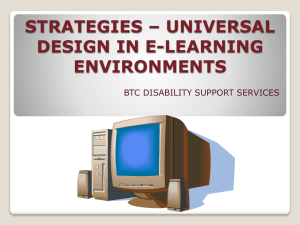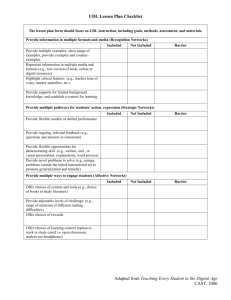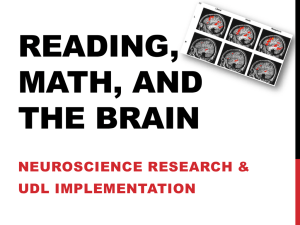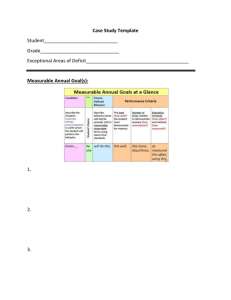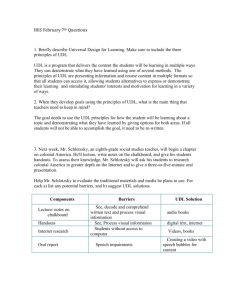Universal Design for Learning Strategies You Can Use!
advertisement
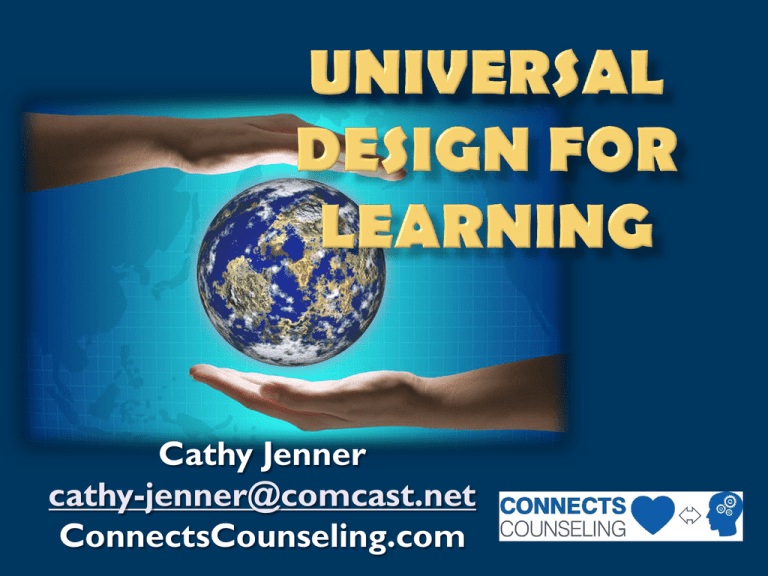
Cathy Jenner cathy-jenner@comcast.net ConnectsCounseling.com Introductions Pre Survey Understanding the need for UDL. Why learn a new teaching paradigm like UDL? Basics of UDL. What is UDL and how does it work? Understanding the “typical learner”. How does knowing how learners learn impact how teachers teach? How do we apply what we know? Take a moment to write down some of the challenging behaviors or problems that students bring to the classroom or to your environment. 28% of first-time, FT, associate degree-seeking CC students graduate with a certificate /associate degree within 3 years Only 52% of first-time full-time college students in public CCs return for their 2nd year Center for Community College Student Engagement , 2010 "Universal design seeks to encourage attractive, marketable products that are more usable by everyone. It is 1941-1998 Ron Mace, founder and program director of The Center for Universal Design, N.C. design for the built environment and consumer products for a very broad definition of user." - Ron Mace 1. 2. 3. 4. 5. 6. 7. Equitable in use Flexibility in use Simple and intuitive Perceptible information Tolerance for error Low physical effort Right size and space for approach and use 1941-1998 Ron Mace, founder and program director of The Center for Universal Design, N.C. Activity Universally designed Variability Matters Video, Dr. Todd Rose of CAST Questions to Ponder: How are you impacted by learner variability? Does variability make your job more complex or more fulfilling? Accessible Consistent Flexible Explicit Supportive Minimizing Physical Effort Effective Learning Space http://www.uoguelph.ca/tss/projects/uid/index.html How do we do it? Multiple means of: Representation Engagement Expression Do your students recognize and understand? Abbreviations Acronyms Mathematical symbols What else?? Multiple ways of finding out what students know: Tests Projects Demonstrations Motivation Meaning Appropriate level(s) of challenge Assistance to become more independent Representation Expression Engagement Flashcards: A way to represent connection of words and meanings Flashcards: Students can use them to self quiz and show what they know Flashcards: may be enjoyable for some Students, can be physical Think of a strategy that you use. How does it offer “multiple means”? Affective Network: Why? Strategic Network: How? Recognition Network: What? Activity: Suppose you gave this picture to your students and asked them to write a paragraph on their opinion of it. How do the networks come in to play? What if a student had a deficit in one of the networks? Think about your main form of teaching or presenting information. Which networks are called on most? What might go wrong for students who have barriers in some of the networks? UDL Users Group Video BINGO (video) Guided Notes Organizing Skills Cornell Notetaking Document Camera Interactive Whiteboard http://www.cmu.edu/teaching/technology/ http://4teachers.org: http://www.teachingwithtech.net/ http://larryferlazzo.edublogs.org/about/my-bestof-series/ Activity: Take the Pre-Test Is the following website ACCESSIBLE? Not too “busy” websites Material that can be read by screen readers Able to move in the classroom to hear and see 13 point font minimum Structure class for no surprises Differentiate between Required and Optional in lectures, assignments, etc. Materials organized in a way that make them easy to navigate An instructor uses a rubric that has very similar structure for all assignments. “Students must purchase the following 3 texts books, current edition. All readings will be from these 3 texts.” Providing choice in materials, assignments Resources that can be accessed in class, at home, at Library Variety of strategies for teaching The instructor goes over the syllabus at the beginning of class and then reviews it again about a week later. Rules clearly explained more than once Help students with “College Knowledge” Face class and make eye contact Use a microphone “You will be graded on two papers. One paper is due at midterm and one paper is due at the end of the class.” “Assignments MUST be handwritten in black ink.” Activity: Quick Learning Assessment Name 3 of the 7 principles Making it Explicit: Half the Info Strategy Why does it work? 1. 2. 3. 4. 5. 6. 7. Effective Learning Space (physical or online) Accessible Flexible Consistent Explicit Supportive Minimize unnecessary physical effort Classroom Individual Counseling Accommodation for Few Services in the Classroom Individualized Intervention Accommodation 2006-07 survey of students in UDL classrooms -98% reported that UDL positively affected their ability to learn. Data from Renton Technical College UDL Project: http://webs.rtc.edu/ii/UDL%20Project.htm 350 300 250 200 150 100 50 0 Disabled students registered From Washington State Board data 2000-01 2003-04 2005-06 2006-07 http://webs.rtc.edu/ii/UDL%20Project.htm www.CAST.org www.UDLcenter.org www.accessed.r2d2.uwm.edu/Learn_UDE/ http://webs.rtc.edu/ii/dsdp.html http://www.tacomacc.edu/cms/One.asp x?portalId=43428&pageId=66310 http://www.youtube.com/user/SeattleCe ntralSCCC -created by a Washington State UDL users group http://www.youtube.com/watch?v=7SG1IwzHhi U-- shows how a college uses assistive technology to improve learning http://www.washington.edu/doit/Video/index.p hp?vid=13 By DO-IT program of UW, Equal Access through UDL How does knowing how learners learn impact how teachers teach? 1. Encoding 2. Storage 3. Retrieval Getting it in -attention -attaching -repeating Two main ways to encode into longer term memory: 1. Repetition 2. Rehearsal • Within 30 seconds • Again 1-3 hours • Again 24 hours Dr. John Medina, Director of Seattle Pacific University’s Brain Center for Applied Learning Research • Repeat over and over! Elaboration (keywords, pictures) Example: Using Stories Mnemonics Perinatology 2. Rehearsal (attaching in multiple ways) promotes deeper learning but not necessarily memorization ACTIVITY Take a minute to think of a lesson that requires both memorizing (repetition) and deeper understanding (rehearsal). Are you teaching students to use both kinds of strategies? If not, what can you change? Improving students’ ENCODING Teach how encoding works and encourage practice Pay attention to brain networks Recognition, Strategic and Affective Use multiple means of Representation, Engagement and Expression Ability to manipulate information in your brain : Teach students that Practicing or Repeating is necessary for continued Storage. Retrieval + Expression demonstrate learning Self-Testing enhances long term memory more than studying Teach students that they have to practice retrieval, using how they will be assessed! Divided Alternating Prime-time-1 Degree of Retention Prime-time-2 Down-time 0 10 20 30 Time in Minutes 40 Reference David
